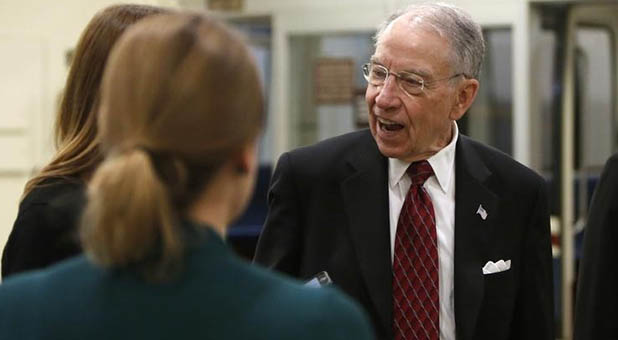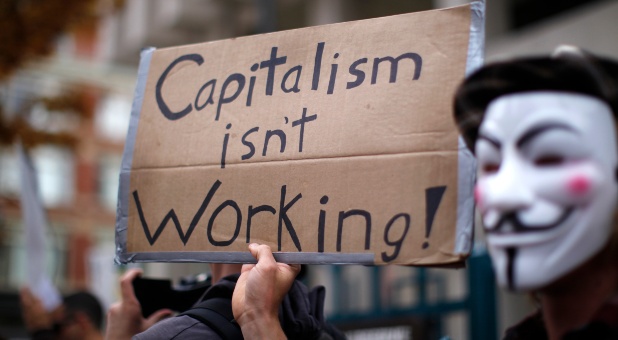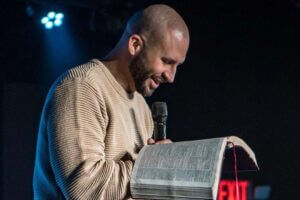In response to claims from Democrats that Senate Republicans are attempting to politicize the U.S. Supreme Court by refusing to hold hearings on President Obama’s nominee, Judge Merrick Garland, U.S. Sen. Chuck Grassley (R-Iowa) let loose in a floor speech Tuesday.
“A significant number of Americans believe the Supreme Court is highly politicized,” the Senate Judiciary Committee Chairman said. “Its approval rating has fallen over the years. Not surprisingly, its approval rating has dropped most drastically in recent years following the president’s appointment of Justices Sotomayor and Kagan …
“But in a speech shortly before Justice Scalia’s death, Chief Justice Roberts maintained that the public wrongly thinks the Justices view themselves as Democrats or Republicans. Of course, it’s irrelevant to the public how the Justices view themselves. What’s troubling is that a large segment of the population views the Justices as political.”
Grassley said it is both “appropriate” and “instructive” to ask why that is the public perception, and to determine whether or not it’s warranted. In his view, public’s perception is sometimes warranted.
“The Chief Justice ruled out that this perception has anything to do with what the Justices have done,” he said. “Instead, he attributes it to the Senate’s confirmation process. As he sees it, senators ‘frequently ask us questions they know it would be inappropriate for us to answer. Thankfully, we don’t answer the questions.’
“The Chief Justice also stated, ‘When you have a sharply divided political divisive hearing process, it increases the danger that whoever comes out of it will be viewed in those terms. You know if the Democrats and Republicans have been fighting so fiercely about whether you’re going to be confirmed, it’s natural for some members of the public to think, well, you must be identified in a particular way as a result of that process.’
“On the one hand, the Chief Justice identified precisely why it would be bad for the court and the nominee to move forward in the middle of a hotly contested presidential election campaign. … But in another respect, the Chief Justice has it exactly backward. The confirmation process doesn’t make the Justices appear political. The confirmation process has gotten political precisely because the court has drifted from the constitutional text, and rendered decisions based instead on policy preferences.”
Grassley said the Justices themselves have “gotten political,” and as a result of their politically driven opinions, which often “transgress” their constitutional role, the process of nominating a confirming justices has become political. He then took his position a step farther suggesting his constituents believe Roberts himself is “part of this problem.”
“They believe that a number of his votes have reflected political considerations, not legal ones,” he said. “And certainly there are academics who agree. In a recent New York Times article academics appealed to the Chief Justice’s political side. They’re asking him to intervene in the current Supreme Court vacancy, suggesting it could be a ‘John Marshall moment’ for him.
“That’s a political temptation that the Chief Justice should resist.
“I can’t think of anything any current Justice could do to further damage respect for the court at this moment than to interject themselves into what Chairman Biden called the political “cauldron” of an election year Supreme Court vacancy.”
Referring to a recent quote from Roberts, Grassley said “tens of millions of Americans” are correct in their belief the Supreme Court has “transgressed the limits of its role,” and too many of the justices are imposing their views, rather than interpreting the law.
He said that’s why there should be a national debate about the proper role of the Supreme Court and its justices, and whether or not the current justices are adhering to their constitutional roles. He then responded to a comment by Roberts that many of the Supreme Court’s decisions are unanimous, or nearly so, but that justices tend to disagree on “hot button issues.”
“We all know what kinds of cases he had in mind,” Grassley said. “Freedom of religion, abortion, affirmative action, gun control, free speech, the death penalty and others. The Chief Justice was very revealing when he acknowledged that the lesser known cases are often unanimous and the ‘hot button’ cases are frequently 5-4.
“The law is no more or less likely to be clear in a ‘hot button’ case than in other cases. For those justices committed to the rule of law, it shouldn’t be any harder to keep personal preferences out of politically charged cases than others.”
Grassley noted that when the justices are “deeply invested in the policy implications” of a ruling, they will forgo following the law, which results in the inevitable 5-4 decision.
“The explanation for these 5-4 rulings must be that in the ‘hot button’ cases, some of the justices are deciding based on their political preferences and not the law,” he said. “But, if ‘hot button’ cases are being decided by politicians in robes, then the Supreme Court has no more of a right than the voters to be the final word.
“The Chief Justice regrets that the American people believe the court is no different from the political branches of government. But again, with respect, I think he is concerned with the wrong problem. He would be well-served to address the reality, not the perception, that too often, there is little difference between the actions of the court and the actions of the political branches.
“Physician, heal thyself.”
If the justices stuck to the constitutional text, Grassley added, basing decisions on the rule of law rather than policy preferences, or what’s “in their heart,” to borrow a phrase from President Obama, senators wouldn’t need to ask about policy questions. Is it any wonder, he asked, that Americans believe the court is political?
“If we want the confirmation process to be less divisive, if we want the public to have more confidence that the Justices haven’t exceeded their constitutional role, then the justices need to demonstrate that in politically sensitive cases, their decisions are based on the Constitution and the law and not on their political preferences,” he said. “When the justices return to their appropriate role of deciding cases based on the facts and law, public perception of the court will take care of itself.”
See an error in this article?
To contact us or to submit an article




















